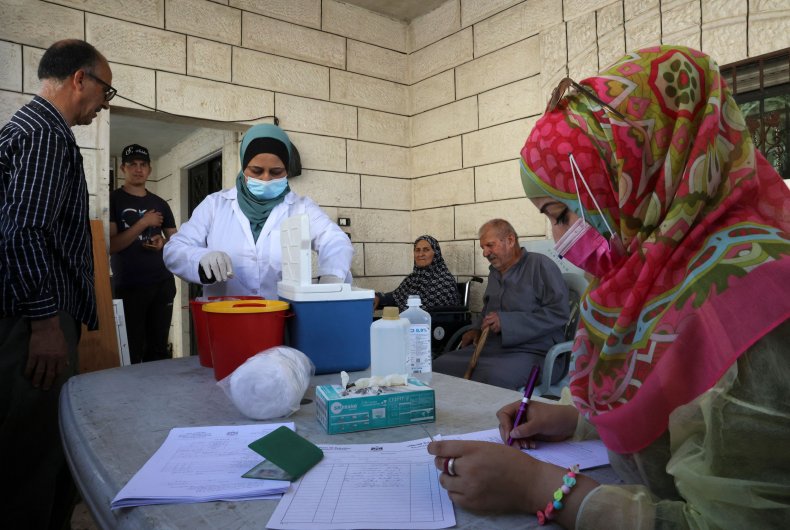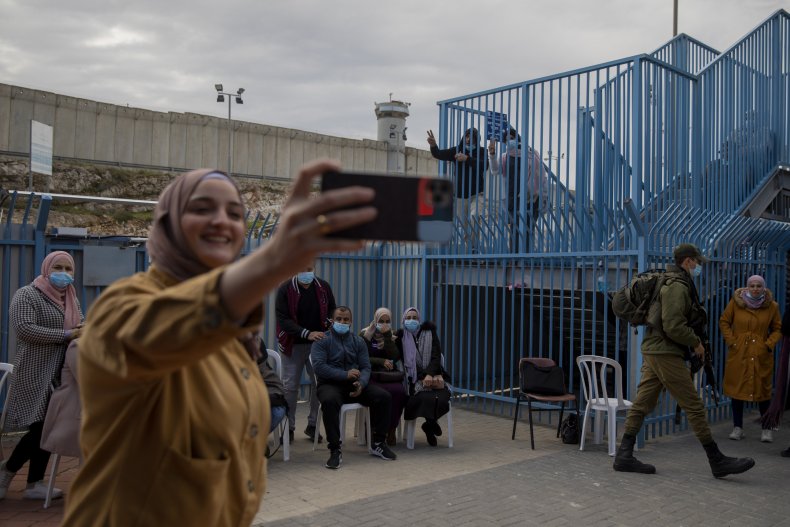Palestinians Call Off Deal to Get 1M Vaccines From Israel Hours After News of Agreement
Palestinians have called off a deal to get 1 million COVID-19 vaccine doses from Israel.
Palestinian officials faced heavy criticism online after the deal was announced, with many accusing them of accepting vaccines that might not be effective.
The newly sworn-in Israeli government said it was set to transfer the doses in exchange for a similar number of doses later in the year. About 85 percent of Israelis are vaccinated, and the country has fully reopened.
Palestinian officials, however, said the deal was reached directly with Pfizer as a way of speeding up its delivery of 4 million doses for which the Palestinian Authority (PA) had already paid.
"This is not an agreement with Israel but with the Pfizer company," Palestinian Health Minister Mai Alkaila said Friday before the deal was called off. Palestinian officials found that the doses were nearly expired and "did not meet standards and so we decided to return them," according to Alkaila.

For more reporting from the Associated Press, see below:
Prime Minister Mohammad Shtayyeh ordered the cancellation of the agreement and the return of the vaccines to Israel, his spokesman said. Ibrahim Milhim said the Palestinians would not accept "about-to-expire" vaccines from Israel, citing the official Israeli statement.
Israel, which has fully reopened after vaccinating some 85 percent of its adult population, has faced criticism for not sharing its vaccines with the 4.5 million Palestinians in the occupied West Bank and Gaza.
COGAT, the Israeli military body that coordinates civilian affairs in the occupied territories, said it had coordinated the delivery of the first 100,000 doses to the West Bank on Friday.
"We will continue to find effective ways to cooperate for the benefit of people in the region," Foreign Minister Yair Lapid tweeted after the deal was announced.
Israel has carried out one of the most successful vaccination programs in the world, allowing it to fully reopen businesses and schools. This week, authorities lifted the requirement to wear masks in public, one of the last remaining restrictions.
Rights groups have said that Israel, as an occupying power, is obliged to provide vaccines to the Palestinians. Israel denies having such an obligation, pointing to interim peace agreements reached with the Palestinians in the 1990s.
Those agreements say the PA, which has limited autonomy in parts of the occupied West Bank, is responsible for health care but that the two sides should cooperate to combat pandemics. Israel has offered vaccines to the more than 100,000 Palestinians from the occupied West Bank who work inside Israel, as well as Palestinians in east Jerusalem.
Gaza is ruled by the Islamic militant group Hamas, which is considered a terrorist organization by Israel and Western countries. Israeli officials have suggested linking any supply of vaccines to Gaza to the return of two Israeli captives and the remains of two soldiers held by Hamas.
The PA has said it is acquiring its own supplies through agreements with private companies and a World Health Organization program designed to aid needy countries.
To date, around 380,000 Palestinians in the West Bank and around 50,000 in Gaza have been vaccinated. More than 300,000 infections have been recorded in the two territories, including 3,545 deaths.
Israel captured the West Bank, Gaza and East Jerusalem in the 1967 Mideast war. The Palestinians want a state in all three territories. There have been no substantive peace talks in more than a decade.


